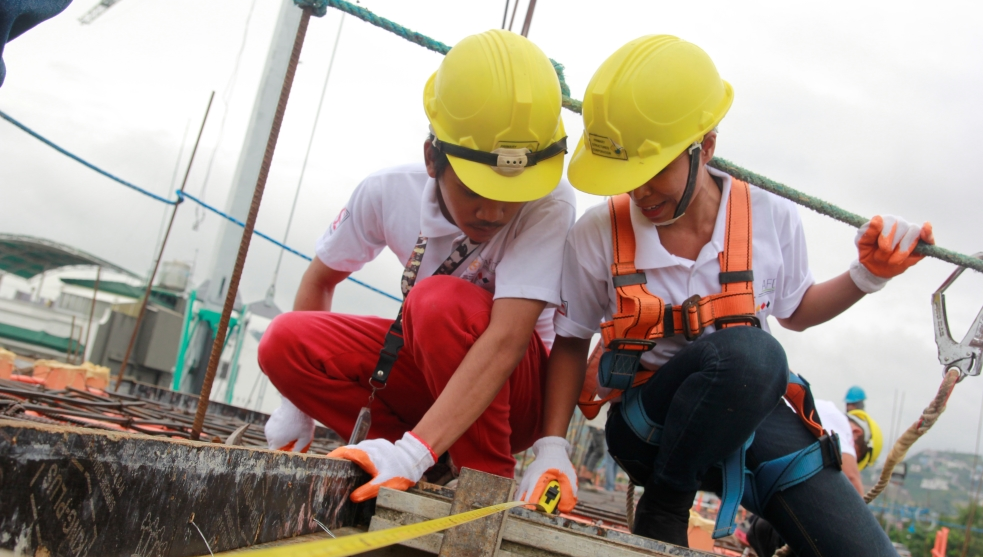
THE ASSESSMENT SERVICES
The strong involvement and participation of all the stakeholders, especially with the companies and schools, through continuous dialogues is pursued by CCCI to sustain the Assessment, Certification and Accreditation Services (ACAS). The assessment service of the chamber is design for individuals with bundle of skills identified by industries as requirements to attain a competitive workforce.
There are 3 components:
1. Basic Qualification Certificate (BQC) Assessment
The BQC assessment is an industry certification that attests to the readiness of senior high graduates for specific job profile and job functions identified by the industries. It specifies the bundle of competencies acquired through Dual Training (in-school classes and at least 800 hours of curriculum-driven company immersion).
Currently, CCCI identified
| INDUSTRY SECTOR | JOB PROFILE |
| Construction | Builder Assistant |
| Food Manufacturing | Food Processing Assistant |
| Tourism- Hospitality | Hotel and Restaurant Service Assistant |
- BQC Application Form
- BQC Personal Declaration Form
- Immersion Logbooks
- Company Immersion Certificates
- Performance Evaluation from Companies
- Senior High School Diploma
- Original NC Certificates Issued by TESDA
A team of a minimum of three by the chamber appointed assessors recommended:
- One representative from the private sector (In-Company Trainer not from the candidates’ company)
- One representative from the trade association
- One from the local Chamber Should any of the last two be not available a representative from local TVI can be considered

2. Advanced Qualification Certificate (AQC) Assessment
The AQC Assessment is designed to an individual who already has a Basic Qualification Certificate (BQC) and has the additional industry experience and acquired additional relevant skills set as prescribed by the industry sector.
- The assessment process and guidelines are VALID, RELIABLE, FAIR and PRACTICAL;
- The assessment shall cover all competencies, with common & elective competencies integrated or assessed concurrently with the core units. The reference materials for the assessors are:
INDUSTRY SECTOR JOB PROFILE Construction Specialty Installer Food Manufacturing Food Processing Technician - The assessment process is based on evidence or information gathered to prove the achievement of competencies outlined in occupational profiles;
- The AQC self-assessment guide (SAG) is accomplished by the candidate prior to the actual assessment. This tool will help the candidate and the assessor determine what evidence is available, where gaps exist, including readiness for assessment;
- The assessment panel was established to oversee, administer and regulate the assessment process. Only accredited/ appointed assessors are authorized to be part of the assessment panel;
- Assessment conditions and rules are clearly explained to the candidate before and during the assessment process; and
- All assessment records are accessible to all relevant parties.
| ASSESSMENT METHOD | PERCENTAGE RATE |
| Portfolio assessment | 15% |
| Theory assessment | 20% |
| Practical assessment | 40% |
| Technical discussion of core competencies | 25% |
- Application Form
- Personal Declaration Form
- BQC Certificate
- NC III/ Equivalent Certificates
- In-company Training Logbook
- In-company Training Certificate (indicating the total hours completed over required hours)
- Performance Evaluation of the Company
- Institutional Assessment Result (from the Technical Vocational Institute)


- Before the assessment:
- Documents to be submitted to CCCI ACAS
- The accomplishment of the AQC forms
- On the first day of the assessment, you will be oriented on the following:
- AQC Assessment Methods
- Weight of the AQC Assessment Methods
- Instructions in the conduct of the theoretical assessment
- On the second day of the assessment, you will be oriented on the following:
- Instructions in the conduct of the practical assessment
- Instructions in the conduct of the technical discussion
- Your assessors will finalize the rating for the following:
- Score of the portfolio assessment
- Score of the theoretical assessment
- Score of the practical assessment
- Score of the technical discussion or oral questioning
- The AQC Panel Assessment is based on the score you obtained:
- for issuance of AQC certificate: AQC total score of 80 and above
- for issuance of AQC certificate after submission of additional documents: total score of 70 to 79
- for re-assessment / non-issuance of AQC certificate: AQC total score of 69 and below
- At the end of the assessment, you shall be provided feedback on the assessment results. The feedback to be given shall indicate whether you will be
- Registered and certified by CCCI as holder of an Advanced Qualification Certificate
- Not yet to be registered and certified by CCCI as holder of an Advanced Qualification Certificate
3. Recognition of Prior Learning/ Certificate of Current Competencies
This is an increasing demand for the development of significant work skills that match standards and workplace competencies. TESDA Attempts to address this through their vocational training program or courses. However, it does not recognize the years of experience of supervisors or managers in their own business.
The recognition of prior learning is the acknowledgment of a person’s skills and knowledge acquired through previous training/ work life experience, and to award a TVET qualification upon proof of competence through a portfolio assessment without prior attendance in a TVET training program. The tools and guidelines for the Recognition of Prior Learning are still to be developed by the Cebu Chamber of Commerce and Industry, Inc.
